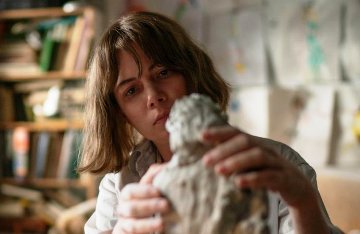
 An introverted sculptor (Michelle Williams) has trouble dealing with people while preparing for a show, in Kelly Reichardt’s amusing study of the relationship between art and ordinary life.
An introverted sculptor (Michelle Williams) has trouble dealing with people while preparing for a show, in Kelly Reichardt’s amusing study of the relationship between art and ordinary life.
Kelly Reichardt has been making movies for thirty years, and has gained steady critical acclaim. Most of her feature films take place in Oregon and tell stories of rural working people, and those on the margins of society—misfits. She refuses to romanticize people by making their ordinary lives fit into some dramatic arc. The result is a cinema of small details, a portrayal of human thoughts, emotions, and desires that make up the texture and meaning of her work. Her latest film is called Showing Up.
Michelle Williams plays a sculptor named Lizzy who works at an Oregon art college. This is Williams’ fourth film with Reichardt; you can tell she has a great affinity with this director, and here she gets to play a different type of person than usual for her. Lizzy makes clay sculptures, about two feet in height, of women in various dynamic poses, ranging from painful to joyous. She has a show coming up, and while preparing for this, her relationships and encounters with artists, friends, family, and others, find her frequently grouchy and impatient. She spars with an artist friend living next door named Jo, played by Hong Chau, who also happens to be her landlady. Jo’s also planning a show, and seems too busy to deal with the fact that there’s been no hot water for days in Lizzy’s apartment.
The key to the film, for me, lies in the scenes with Lizzy working on her sculptures. Williams conveys the intense inwardness of the artist, absorbed and focused on the work, tending to shut everything else out, and how this deeply introverted habit of mind persists in her everyday interactions with others. She’s a dour truth-teller, impatient with other people’s casual avoidance of honesty or responsibility. She works as an assistant to her mother, an administrator at the college, and this is a strain. When she visits her father, long divorced, and played by Judd Hirsch, she’s alarmed that a couple of aging hippies have befriended him and are basically living on the couch, while he acts oblivious to being taken advantage of. And a visit to her adult brother makes clear that his mental illness, including paranoia, has only gotten worse.
As always in a Reichardt film, the problems of human beings are real and sometimes severe. But in Showing Up, she’s come closest to making an actual comedy than ever before. Behind the problems there’s a gentle sense of humor, a rueful awareness of just how strange things really are.
Once again, it’s the little things. For instance Lizzy sees that her cat has brought a pigeon into the house. She takes the bird, still alive, and throws it out the window. The next day her neighbor, Jo, says she found a pigeon with a broken wing in her yard, and asks Lizzy to help her. They wrap the wing and put the bird in a box with food and water, and then Jo asks Lizzy to take care of it for awhile. This is just the beginning of an entire storyline about this pigeon, and it’s a low-key hilarious way of portraying the neurotic mind of a remarkable artist.
Williams is adept at finding ever new inflections in the role of Lizzy. Hers is a profoundly intimate and unglamorous performance, maybe her best. Showing Up makes me smile at the predicament of all seekers who straddle the worlds of art and practical life. It’s a pitch perfect film.

